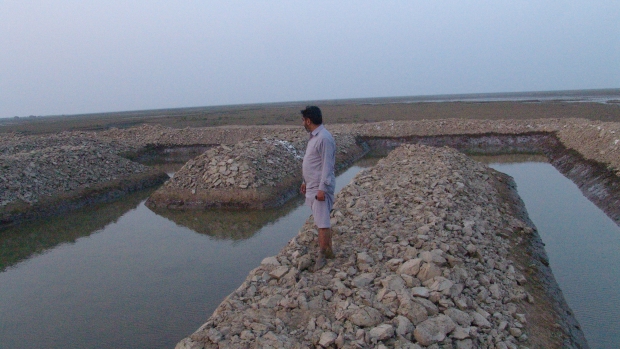Grants :: Small Grant Facilities :: Integrated Shrimp Ponds in the Indus Delta
Integrated Shrimp Ponds in the Indus Delta

Integrated Shrimp Ponds in the Indus Delta
Objectives
- To introduce integrated shrimp ponds in the two villages of Bhoori and Haji Doongar Jat in the Indus Delta.
- To mobilise the local community, raise awareness concerning the exploitation of mangroves and fisheries in the region, and enhance integrated coastal resources management.
Background
Due to the construction of dams and barrages upstream, fresh water flow to the Indus Delta has decreased in recent years leading to acute water shortage in the region, the intrusion of seawater, and the consequent loss of agricultural land. This has had a significant impact on local fishing communities which depended on this land during off-season (May to August) for their livelihood. The loss of this source of income has increased pressure on coastal resources, resulting in unsustainable fishing practices (such as using fine mesh nets) and over-exploitation of mangroves for grazing and fuel wood. The two villages participating in this project are located on either side of the River Indus.
The main objective of this project is not only to help the fishermen in these communities find a stable source of income through rearing and selling shrimp, but also to prevent the current practice of catching juvenile shrimp and depleting future shrimp stocks in the delta area. The idea of piloting low-cost shrimp ponds will not only improve the livelihood of the locals without requiring them to change their traditional livelihood practices, but will also raise awareness among other fishing communities in the area which face similar problems because it is easily replicable. From the income generated from the shrimp ponds, fifty percent will be shared equally among the poor households, twenty percent will be deposited in the CBO’s communal fund, and thirty percent will be reinvested in the ponds. This will ensure that the project will endure after the completion of the project activities set out here. Furthermore, the FRDO will continue to communicate with the local communities in order to sustain the project interventions.
Target beneficiaries
Ten of the poorest households in each village will benefit directly from the project. In addition to this, locals from two other communities in the Indus Delta will benefit from the lessons learnt.
Outputs
- Two shrimp ponds established in the two villages, with mangroves planted along the embankments/bunds and protected by beneficiaries.
- Target beneficiaries (ten poorest households) identified and agreement on mangrove protection, pond management, harvesting, marketing and restocking of ponds, and benefit sharing protocols, established.
- Lessons learnt to be documented and disseminated.
- Community awareness and capacity building regarding integrated coastal resources will be enhanced.
Accomplishments and challenges
- Crab fattening ponds were built and stocked with immature crabs in two villages in which the ten poorest households have been engaged.
- Three thousand mangroves planted along the embankments of the ponds through community participation.
- Awareness, training and experience sharing sessions were organized in each village on sustainable management of fisheries resources and pond management.
Contributions to cross-cutting themes
Communications
Awareness of integrated coastal management through a documentary, a case study, a short video, brochures, and community and media exposure visits at the two sites.
Gender Equality
No particular emphasis on the topic of gender equality in this project.
Climate Change
Planting and protection of mangroves along pond embankments will shelter the vicinity from natural disasters such as cyclones and tsunamis.
Lessons Learned
- The attempts to establish shrimp ponds did not succeed due to mortality of wild shrimp larvae during transportation; hence, the ponds were converted to crab fattening ponds in consultation with community.
- The harsh weather conditions resulted in damage to one of the ponds resulting in escape of crabs. The other is being managed by community for crab fattening.
- Due to price inflation the project faced significant variation in cost estimates; hence, inflation factor needs to be built-in in cost estimates for a smooth project delivery.
- Project contributed to capacity building of community organisation in project management and communication skills.
Project Facts
Country
Location
Bhoori Village and Haji Doongar Jat
Topic
- Economic Valuation
- Sustainable Livelihoods
- Sustainable Business Practices
- Capacity development
- Gender equality
- Knowledge management and communications
Duration
5th Jul 2013 to 5th Jul 2014
MFF Grant Amount
PKR 951,000
Implementing Partner
Fisherman Rural Development Organisation (FRDO)
Muhammad Umar Jat
Email: frdoketibundar@yahoo.com